Wikipedia:Picture of the day/August 2004
|
Featured picture tools: |
These featured pictures, as scheduled below, appeared as the picture of the day (POTD) on the English Wikipedia's Main Page in August 2004.
You can add an automatically updating POTD template to your user page using {{Pic of the day}} (version with blurb) or {{POTD}} (version without blurb). For instructions on how to make custom POTD layouts, see Wikipedia:Picture of the day.
August 1

|
Yellowstone National Park is a United States National Park located in the states of Idaho, Montana, and Wyoming. Yellowstone is the first and oldest national park in the world. The park is famous for its geothermal features and is home to grizzly bears, wolves, bison and elk. Photo credit: Daniel Mayer
Recently featured:
|
August 2
| File unavailable |
Royal Doulton Darby and Joan figurines. "Darby and Joan" is a term used to describe a happily married couple. In England, clubs for senior citizens are appropriately called Darby and Joan Clubs. The first mention of John Darby and his wife Joan is believed to be in a poem by Henry Woodfall in 1735. At that time Woodfall was apprentice to Darby, a printer from the town of Bartholemew Close. Photo credit: Paul Darby
Recently featured:
|
August 3

|
Halong Bay (Vịnh Hạ) is a body of water in north Vietnam in the Gulf of Tonkin near the border with China. Its name means "Bay of the Descending Dragon" in Vietnamese. The bay consists of a dense cluster of 1969 limestone monolithic islands, each topped with thick jungle vegetation, which rise spectacularly from the ocean. Photo credit: David Stewart
Recently featured:
|
August 4
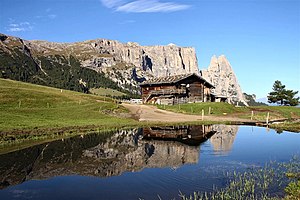
|
The Schlern is a 2,563m high mountain of the Dolomites in South Tyrol, Italy. The Dolomites are a section of the Alps in northern Italy. The name Dolomites is derived from the French mineralogist Deodat de Dolomieu who was the first to describe the mineral Dolomite which is responsible for the characteristic shapes of these great limestone mountains. Photo credit: Fantasy
Recently featured:
|
August 5

|
London by night. London is the capital of the United Kingdom and of England. The city of Londinium was founded by the Romans on the north bank of the River Thames in around 50 AD. By the 18th century London was the biggest city in the world. It was the most populous city in the world from 1825 until 1925, when it was overtaken by New York City. Photo credit: NASA
Recently featured:
|
August 6
| File unavailable |
The fennec is a small fox found in the desert of Northern Africa. The fennec is the smallest canid, only weighing up to 1.5 kg. The fennec is nocturnal and hunts for rodents, insects, lizards, birds and eggs at night. The fennec is rare and is not often seen. It is often hunted by humans, even though the fox does not cause any harm to human interests. Photo credit: Ralf Schmode
Recently featured:
|
August 7

|
A thunderstorm is a form of severe weather involving lightning and thunder. Thunderstorms have had a lasting and powerful influence on mankind. Romans thought them to be battles waged by Jupiter. Thunderstorms were associated with the Thunderbird, held by Native Americans to be a servant of the Great Spirit. Photo credit: Johan Kerstholt
Recently featured:
|
August 8
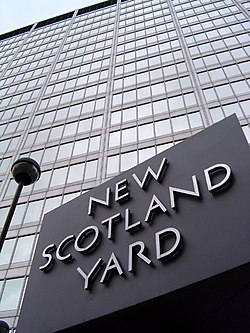
|
New Scotland Yard, located at Broadway in Westminster, is the headquarters of the Metropolitan Police Service who are responsible for policing Greater London. The name derives from its original location on a street off Whitehall called Great Scotland Yard. The exact origins of this name are unknown, though a popular explanation is that it was the former site of the residence of the Scottish kings or their ambassadors when staying in England. Photo credit: ChrisO
Recently featured:
|
August 9
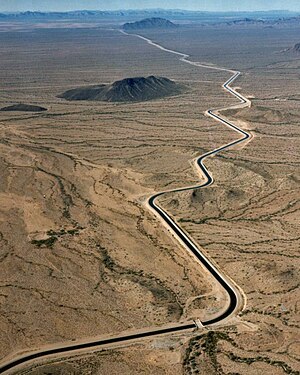
|
The Central Arizona Project Aqueduct is a diversion canal in Arizona in the United States. The aqueduct diverts water from the Colorado River from Lake Havasu City into central and southern Arizona. The Central Arizona Project is a multipurpose water resource development and management project that was designed to provide water to nearly one million acres of Indian and non-Indian irrigated agricultural land areas as well as municipal water for several Arizona communities. Photo credit: US Bureau of Reclamation
Recently featured:
|
August 10
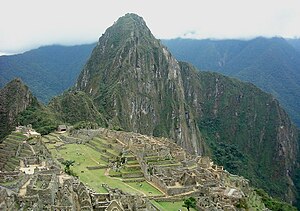
|
Machu Picchu is a well preserved Pre-Columbian town located on a high mountain ridge above the Urubamba valley in modern-day Peru. It is thought the city was built by the Inca emperor Pachacuti starting in about 1440 and was inhabited until 1532. The city was re-discovered in 1911 by Hiram Bingham. This World Heritage Site is a popular tourist attraction. Photo credit: Chmouel Boudjnah
Recently featured:
|
August 11

|
A mackerel sky is an indicator of moisture and instability at high levels. If the lower atmosphere is stable and no moist air moves in, the weather will most likely remain dry. However, moisture at lower levels combined with temperature instability can lead to spectacular thunderstorms should the rising moist air reach this layer. In weather lore, a mackerel sky portends changeable weather. Photo credit: Denni Windrim
Recently featured:
|
August 12
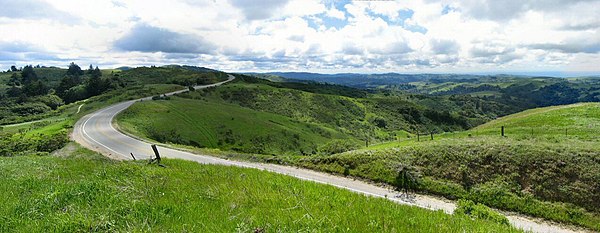
|
|
Skyline Boulevard runs through the Santa Cruz Mountains, here near Palo Alto, California. The Santa Cruz Mountains, part of the Coast Ranges, are a mountain range in central California. They form a ridge along the San Francisco Peninsula, south of San Francisco, separating the Pacific Ocean from San Francisco Bay and the Santa Clara Valley, and continuing south, bordering Monterey Bay and ending at the Salinas Valley. Photo credit: Jawed Karim
Recently featured:
|
August 13

|
City Hall in London is the headquarters of the Greater London Authority, and stands on the south bank of the River Thames near to Tower Bridge. The building was designed by Sir Norman Foster and opened in July 2002. It has an unusual bulbous shape, intended to reduce the building's surface area and thus improve energy efficiency. City Hall was constructed on a site formerly occupied by wharves serving the Pool of London (a stretch of the River Thames). Photo credit: ChrisO
Recently featured:
|
August 14

|
A medieval image resembling the cartoon character Mickey Mouse was discovered on November 14 2002 during restoration of a church's outside wall in the town of Malta in Austria. It is part of a 14th century fresco depicting Saint Christopher of the Catholic Church, who is often shown accompanied by fabulous creatures. Photo credit: Unknown 14th century source
Recently featured:
|
August 15

|
The Painted Bunting (Passerina cirisgenus) belongs to the Passerina group of birds in the Cardinal family Cardinalidae. Not directly related to buntings in the family Emberizidae, they are sometimes known as the North American buntings. They have short tails and short slim legs. They have smaller bills than other Cardinalidae; they mainly eat seeds in winter and insects in summer. Photo credit: U.S. National Park Service
Recently featured:
|
August 16

|
U.S. F/A-18 Hornet breaking the sound barrier. In aerodynamics, the sound barrier is the apparent physical boundary stopping large objects becoming supersonic. When an aircraft breaks the sound barrier, an unusual cloud sometimes forms. A drop in pressure, in this case due to shock wave formation, causes water droplets to condense and form the cloud. Photo credit: John Gay
Recently featured:
|
August 17
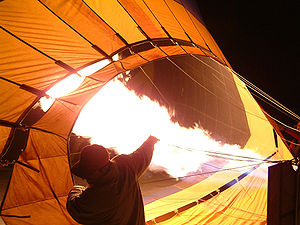
|
Hot air balloons are the oldest successful human flight technology, dating back to the Montgolfier brothers' invention in Annonay, France in 1783. The first manned flight was made in Paris by Pilâtre de Rozier and the Marquis d'Arlandes. Unmanned hot air balloons are mentioned in Chinese history. Chu-ko Kung-ming (諸葛 孔明) in the three kingdoms era used airborne lanterns for military signalling. Photo credit: Randy Oostdyk
Recently featured:
|
August 18

|
The Montreal Metro, operated by the Société de transport de Montréal, was inaugurated in 1966. Originally comprising 26 stations on three lines; the metro has now expanded to 65 stations on four lines, serving the centre and east of Montreal Island with a connection to Longueuil and, soon, Laval. Montreal metro lines are identified by colour, by number, and by terminus station. Photo credit: Montrealais
Recently featured:
|
August 19

|
|
Bryce Canyon National Park is a national park located in southwestern Utah in the United States. Contained within the park is Bryce Canyon, a giant natural amphitheater created by erosion along the eastern side of the Paunsaugunt Plateau. Bryce Canyon was not formed from erosion initiated from a central stream, meaning it technically is not a canyon. Photo credit: Daniel Mayer
Recently featured:
|
August 20

|
The movement and the flow of chemicals into the stomach are controlled by both the autonomic nervous system and by various digestive system hormones. Gastric acid is the main secretion of the stomach, characterised by H2O, hydrochloric acid and several enzymes (mainly pepsinogen). Gastic acid is produced by the parietal cell (wall cell) of the gastric mucosa. Photo credit: Prisonblues
Recently featured:
|
August 21

|
Twilight Wilderness, by Frederic Edwin Church. Frederic Edwin Church was a central figure in the Hudson River School of American landscape painters. Church became the pupil of Thomas Cole at eighteen and was elected as a member of the National Academy of Design in 1849.
Recently featured:
|
August 22

|
Highgate Cemetery, located in Highgate, London, England, was opened in 1839 as part of an initiative to provide seven large, modern cemeteries in a ring round the outside of London. Highgate was a fashionable place for burials. The Victorian attitude to death and its presentation led to the creation of a wealth of Gothic tombs and buildings. Photo credit: Michael Reeve
Recently featured:
|
August 23

|
Exploded view of an Enigma rotor. The Enigma was a small, portable electro-mechanical rotor machine used to encrypt and decrypt secret messages. Key: (1) notched ring; (2) marking dot for "A" contact; (3) alphabet tyre; (4) plate contacts; (5) wire connections; (6) pin contacts; (7) spring-loaded ring adjusting lever; (8) hub; (9) finger wheel; (10) ratchet Photo credit: Eric Pierce
Recently featured:
|
August 24
| File unavailable |
Perito-Moreno glacier in Patagonia, Argentina A glacier is a large, long-lasting river of ice that is formed on land and moves in response to gravity. Glacier ice is the largest reservoir of fresh water on Earth, and second only to the oceans as the largest reservoir of total water. Glaciers are found on every continent except Australia. Photo credit: Chmouel Boudjnah
Recently featured:
|
August 25

|
David Scott in a space suit. A spacesuit is a complex system of garments, equipment, and environmental systems designed to keep a person alive and comfortable in the harsh environment of outer space. Related preceding technologies include the gas mask used in WWII, the oxygen mask used by pilots of high flying bombers in WWII, the high altitude or vacuum suit required by pilots of the Lockheed U-2 and SR-71 Blackbird, the diving suit, rebreather and scuba diving gear. Photo credit: Jawed Karim
Recently featured:
|
August 26

|
The Mahameru volcano on the island Java in Indonesia. A volcano is a geological landform where magma erupts through the surface of the planet. There are numerous volcanoes on the Solar System's rocky planets and moons. On Earth at least, this phenomenon tends to occur near the boundaries of the continental plates. Photo credit: Jan-Pieter Nap
Recently featured:
|
August 27
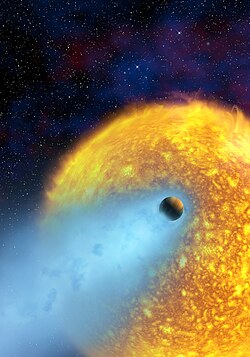
|
Osiris is an extrasolar planet that orbits the Sun-like star HD 209458 in the constellation Pegasus, some 150 light years from Earth's solar system. HD209458 is a 7th magnitude star, visible on Earth with binoculars. The radius of its orbit is only 7 million kilometers, resulting in a year only 3.5 Earth days long and an estimated surface temperature of about 1000°C.
Recently featured:
|
August 28

|
Pearl Harbor is a complex embayment on the island of O'ahu, Hawai'i, west of Honolulu. Originally an extensive, shallow inlet or bay called Wai Momi, meaning "Water of Pearl", or Pu'uloa, by the Hawaiians, Pearl Harbor was regarded as the home of the shark goddess Ka'ahupahau and her brother Kahi'uka. Pearl Harbor is well known for the attack by Japan in 1941 which brought the United States into World War II. Satellite image credit: NASA
Recently featured:
|
August 29

|
Messier 3 is a globular cluster that was discovered by Charles Messier in 1764. This cluster is one of the largest and brightest, and is made up of around 500,000 stars. It is located within Canes Venatici, a small northern constellation, at a distance of about 33900 light years. Messier 3 is visible to the naked eye in certain conditions. Photo credit: Ryan Bruels
Recently featured:
|
August 30

|
Pitstone Windmill, believed to be the oldest windmill in the British Isles A windmill is an engine powered by wind energy. In Europe, windmills have been used since the Middle Ages. They were developed from the 12th century, apparently from technology gained by crusaders who came into contact with windmills in the Middle East. Persian sources indicate windmill use as early as the 7th century BC. In the United States, the development of water-pumping windmills was a major factor in allowing the farming of vast areas of North America. Photo credit: Michael Reeve
Recently featured:
|
August 31
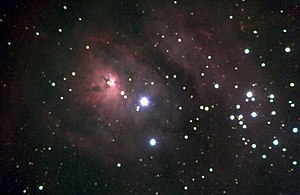
|
Messier 8, commonly known as the Lagoon Nebula, is a Messier object and a diffuse nebula within the Sagittarius constellation. Sagittarius, depicted as a centaur drawing a bow, lies between Scorpius to the west and Capricornus to the east. The Milky Way is at its densest as it passes through this constellation. Photo credit: Ryan Bruels
Recently featured:
|
Picture of the day archives and future dates
